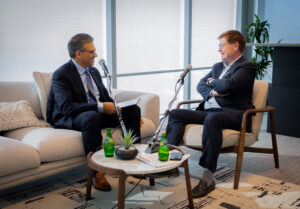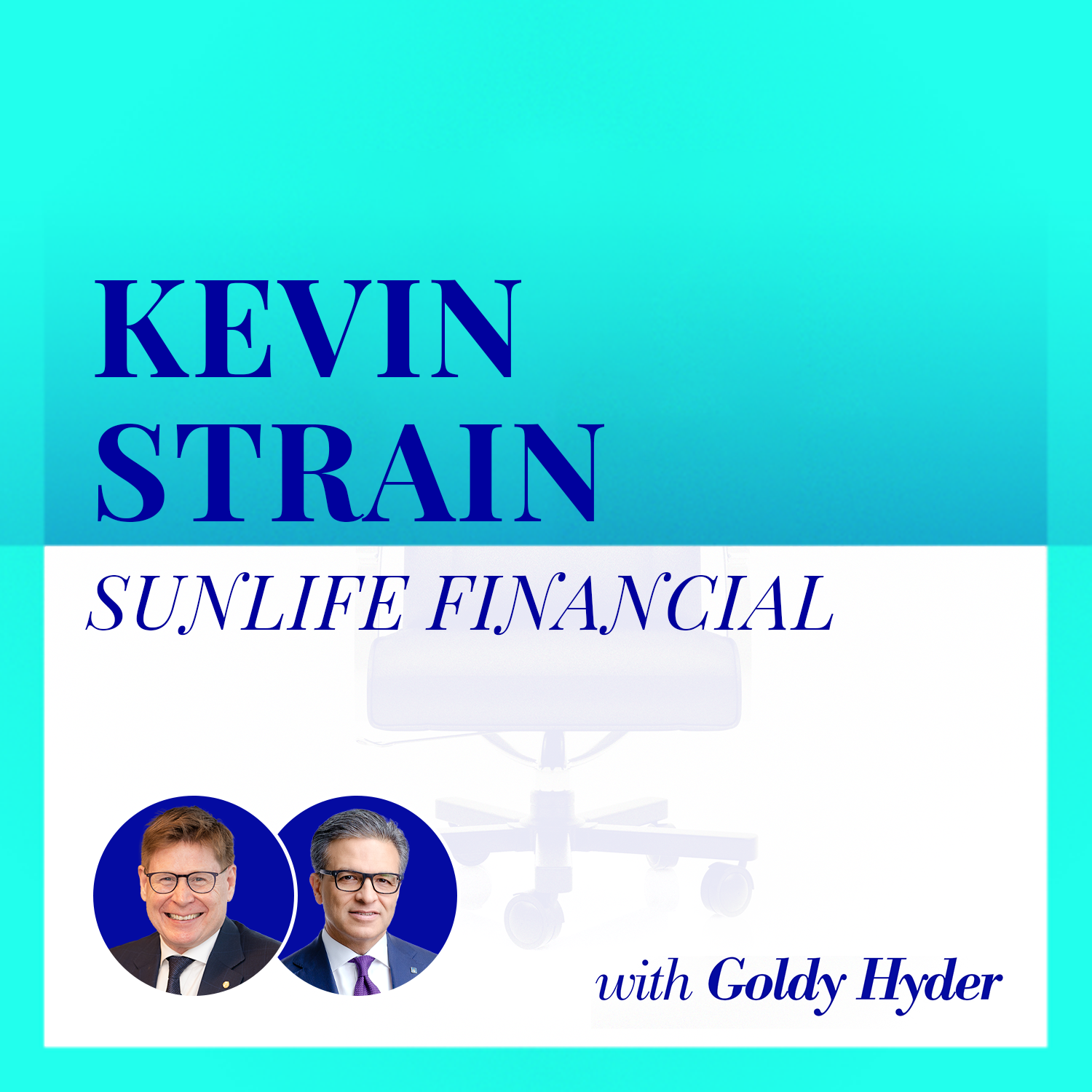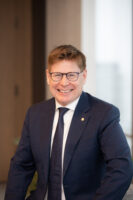Kevin Strain never planned on a career in insurance. But an early job as an auditor led to his introduction to the insurance industry, culminating in his current position as president and CEO of Sun Life Financial.
In this episode of Speaking of Business, Kevin shares how Sun Life grew from a Canadian insurer into a global financial services and asset management giant, and why Asia has become such a key part of that story.
He also weighs in on one of Canada’s biggest challenges: adapting quickly enough to compete in a world of shifting trade and rising geopolitical tension. His advice? Move with speed, lead with purpose, and don’t be afraid to take risks or learn from failure.

“I actually think what I learned about failure is failure is just a step towards winning,” he tells host Goldy Hyder
Listen to the full conversation about leadership, purpose, and the future of Canada on the Speaking of Business Podcast.
Kevin Strain:
We have to recognize first that the world has changed in terms of how it works, how trade agreements are going to work, how business is going to work across geographies. Instead of fighting that, we have to accept that and find what’s going to make us successful, what’s going to make us win.
Goldy Hyder:
Welcome to Speaking of Business: Conversations with Innovators, Entrepreneurs, and Leaders. I’m Goldy Hyder, president and CEO of the Business Council of Canada. From its humble Canadian beginnings in 1865, Sun Life has grown into a global company operating in 28 different markets around the world. The leading financial services organization now employs more than 66,000 people. Much of the company’s expansion has been in Asia, and the person who for many years was responsible for Sun Life’s Asia footprint is now the company’s president and CEO, Kevin Strain.
So, how does a company focused on insurance and asset management navigate the very different and unique client needs of people around the world? Let’s find out. I’m delighted to be able to speak with Kevin Strain today at Sun Life’s head office in Downtown Toronto. Welcome to the podcast, Kevin.
Kevin Strain:
Thanks, Goldy. It’s nice to be here and good to have a chance to talk to you.
Goldy Hyder:
I’m looking forward to this. Listen, I heard that you had this great line where you said, “You don’t pick the insurance industry, it picks you.” How did you end up here?
Kevin Strain:
Well, it’s interesting and nobody really grows up wanting to be in insurance. I mean, as a kid, you don’t even know what it is. I’d never heard of an actuary until I had got into university and it was already too late for me to be one. I’m a CPA by background, and I ended up in the insurance industry. I was an auditor at Ernst & Young, and I was on an audit that required me to count inventory on January 1st in the morning and end of October, because we had to do it twice. I did this three times and we were counting benzene and styrene, carcinogenics. I remember the third time I was there, it’s freezing rain, January 1st in the morning, and we had to climb this tank with a guy who would dip for it to make sure how deep it was and what the chemical was in there. These are carcinogenics. You got a gas mask on and everything. The guy I’m with goes, “I’m sorry, Kevin. I’m afraid of heights. I can’t do this.” So I’m climbing a ladder in the freezing rain, 4:00 AM, January 1st, and I’m like, “I’m not doing this next year.”
Goldy Hyder:
I’m guessing you had a good time the night before.
Kevin Strain:
So I’m not doing this next year. So, I went back to the office and I looked through our accounts and I thought, “What’s the biggest audit client that Sun Life has?” Because I liked working for the public companies, the bigger, more sophisticated accounting issues and those types of things. I was a Waterloo master’s degree guy, and it was London Life. So, I went to the London Life partner and I asked to be on the London Life audit. The rest is history, but it came out of that audit experience.
The audit experience is awesome because you see so many industries, you see so many different cultures of companies and you start to get a sense of what works for you and you learn a lot. It’s great training ground. In those days, we did everything. We did phone calls and you carried big boxes and you had paper files. It was a great, great learning experience, but that’s how I ended up at London Life. Then that got me to here.
Goldy Hyder:
Well, I mentioned it to you. I saw it firsthand. My father had that big briefcase as one of his first things was to sell Sun Life products.
Kevin Strain:
Yeah.
Goldy Hyder:
We went on to a business in insurance later in the P&C side. Now Sun Life itself, obviously a very global brand, very well-known. Anywhere you travel around the world, you’re more than likely to see the brand. It’s known for the insurance, but it’s also an asset management. Tell the listener more about what is Sun Life today?
Kevin Strain:
We’ve grown into an asset management company. Probably 10 years ago, we were an insurance company that owned an asset manager, MFS, but we weren’t an asset management and an insurance company. We had MFS. It was incredibly valuable to us. It was a big player in the industry. It was big in the U.S. retail space, but also big in global institutional space. But that was the sole piece that we had that was asset management. Probably in around 2013, 2014, the company made the decision to expand into becoming really an asset manager.
Goldy Hyder:
As part of a diversification strategy.
Kevin Strain:
As part of diversification. We saw that we had a general account of 200 billion and inside of our general account assets, so our own assets that we hold for policyholders, again policyholders liabilities. We had real estate and we had infrastructure investments and we had private credit and private fixed income. And what we saw was that some of these companies globally that were in the alternative asset management space were taking off. So, I give all the credit to Dean and Steve Peacher.
We started to build out systematically a set of alternative asset management classes that could sit alongside of MFS that would allow us to see across public equity, public fixed income into private fixed income, private credit, infrastructure, and real estate. That gave us the full gambit, which helped us to provide assets to our wealth businesses globally, assets to our general account, but bring those assets to third-party investors. Today, we sit at 1.5 trillion out of that, only 200 billion of the 1.5 trillion in assets is our own. So, we’re a large asset manager for wealth platforms and for third parties. That’s a global business for us, which aligns to Sun Life also being a global business. So, we’re in Canada, U.S., Asia, and Europe.
Goldy Hyder:
How long have you been global?
Kevin Strain:
I would say we’ve truly been a global company since around 2000. We started in Asia 130 years ago, but if you went back 20 years ago, we were pretty small. We were in the Philippines and we had MFS and we had a U.S. business. So, we were North American with a little touch of global. I’d say 20 years ago, we made the decision to enter both India and China as joint ventures and in 2012, when Dean sent me there, we made the decision we wanted to be bigger in Asia. At that time, we were 100 million in income in Asia per year.
Now, we’re closer to, we’d be on a pro forma basis, 800 million in income in Asia. The growth has been incredible. When I went there in 2012, we had about 40 million of what we call value of new business, which is the profitability of our sales. By the time I left in five years, it was 250 million. So, the opportunity’s amazing.
Goldy Hyder:
So Dean, you’re referencing Dean Conner, the former CEO, and the person who decided to send you there. What pitch did he make to you?
Kevin Strain:
His pitch to me was that honestly was that he needed me and he came to me and he said, “Listen, Kevin, we’re not playing to win in Asia. We’re playing not to lose. We don’t have the right leadership.” In fact, he actually said, “If we don’t get the right leadership, I’m not sure that we’re going to be successful there.” So he turned to me and he said, “I really think that you’re the right person.”
I said, “Dean, I’ve only been to Asia once. I did one trip as the head of investor relations to Shanghai and to Mumbai.” I said, “I really don’t know anything.” He said, “Listen, Kevin, I’m going to support you. I think you’re the right person because you come from a retail background and the business needs an energy. We’ve been stuck at 100 million in income for years now and we haven’t really changed to that playing to win concept.” He said, “I think that you’re the right person to do that.” He probably knew I had a little bit of competitiveness to me and-
Goldy Hyder:
Oh, really?
Kevin Strain:
… that it was important. So, I think his pitch was really that the company needed me to do it and he wanted me to do it and that he would support me.
Goldy Hyder:
It’s interesting that phrase play to win rather than play not to lose or play to not lose. You could almost say that about Canada no?.
Kevin Strain:
We’re in a position that we are at an inflection point in Canada. We have to recognize first that the world has changed in terms of how it works, how trade agreements are going to work, how business is going to work across geographies. Instead of fighting that, we have to accept that and find what’s going to make us successful, what’s going to make us win, what’s going to be that piece, and it’s not going to be one thing. It’s going to be a series of things that are the catalyst to help us to win and to restructure, but the first piece is going to be an acceptance that things have changed. We have to understand how they’ve changed and we have to find our way to win in that new environment.
Goldy Hyder:
You use this analogy that the environment we find ourselves today is akin to being a downhill skier. It’s happening fast, and you don’t know if those are moguls, if they’re bumps. We’ve never really been very good at speed in Canada. Do you think we can meet this moment?
Kevin Strain:
I was in a session with a small group of CEOs all from the Business Council of Canada last Monday night with very, very senior members of the government, the most senior that were going down to the U.S. I get the sense that they’re recognizing that we have to create an environment collectively, the government and business, where we can move faster and that we have to eliminate some of the red tape that slowed us down. We have to find ways to invest in infrastructure that’s going to help business. Everybody’s not going to be happy with those changes that we need to make, but it’s a moment that if we don’t move quickly, we’re going to have a tough decade.
Goldy Hyder:
Or more.
Kevin Strain:
Or more.
Goldy Hyder:
By we meaning our kids.
Kevin Strain:
Our kids, all of us, our retirements
Goldy Hyder:
Yes, our healthcare.
Kevin Strain:
Our healthcare. This is going to impact all aspects of Canada if we don’t figure out how. What I’m hearing from the government is they recognize that we have to make a transition. I think the transition is really in three ways. One, we have to take some of what is trade to the U.S. and bring it back and build the domestic economy. That is similar to what the U.S. is trying to do inside of their own economy. We have to say that we have to build infrastructure to move oil and gas east-west versus just north-south. We have to find ways of eliminating provincial tariffs and provincial barriers. I think the government is aware at the provincial level.
Goldy Hyder:
All the intentions are there.
Kevin Strain:
All the intentions are there. So, we have to move fast to fix those things and take about, I’m using as metaphorically, a third of the trade that we do with the U.S. and bring it back and make it domestic.
Goldy Hyder:
Redomicile it.
Kevin Strain:
Redomicile it, and that’s doable. The second thing we need to do is find new trade relationships. And probably this is the hardest of the three, but we have to find a way to take a third of that trade that we do with the U.S. and find ways to open up avenues to send those goods to other places. The best places to do that are Europe and Asia, the other G20 countries. Those are the ones that can actually have big buying patterns for those goods. We have to think about it product by product, country by country, company by company.
Goldy Hyder:
Be very deliberate and intentional.
Kevin Strain:
Be very deliberate and map it out. It’s going to take time, understanding those markets. It’s going to take time visiting, building relationships in those markets. I know the Business Council of Canada is helping to run some trade missions. It’s going to take time for companies to understand how to do business in these new jurisdictions and then the U.S., we have to recognize the U.S. is always going to be our biggest trading partner and we have to figure out how to make that efficient and do the same thing with the U.S., rebuild relationships, rebuild understanding of how the new trade arrangement is going to work, and make ourself efficient.
Goldy Hyder:
So of course, the two elephants in any room you go into today are United States and China and you have businesses in both cases. You have firsthand experiences there. How do you see us navigating that?
Kevin Strain:
Navigating geopolitical tension in general is going to be a new skill that we have to build. I think it’s not even just the U.S. and China. I think every country is rethinking what their relationship is with other.
Goldy Hyder:
It’s an interest-based approach now.
Kevin Strain:
So India, we’re going to have to do the same thing. Japan, we’re going to have to do the same thing. UK, we’re going to have to do the same thing, France, Germany. So, I think that we have to build a skill that builds a deep understanding of what’s important to these countries and how to approach them, what the cultures are like. You have to understand the culture. You’re only going to do that by getting there, spending time, building relationships, understanding what’s important, and understanding how they communicate things. Because communication can be different across cultures and countries and learning how those countries think and operate.
Goldy Hyder:
You got to be there.
Kevin Strain:
Values are often the same. So, you think about what we do, we help people with their financial security, so lifetime financial security and live healthier lives. There’s no country in the world that doesn’t want their citizens to have financial security and live healthier lives. So, one of the things we do as a company is the first thing, if I’m talking to governments, I talk about our purpose and what we do and how we can help their citizens with those things. There’s not a government in the world that doesn’t resonate with. So, I think as businesses, the most important thing we can do is identify our purpose, understand how it resonates in those countries, and-
Goldy Hyder:
Know your customer.
Kevin Strain:
… make that the focus and know your customer. Know your client, know your customer. I give this example. So, as you know, I lived in Hong Kong for five years and I still spend a lot of time in Asia. When you wish somebody a Happy New Year, Gung Hei Fat Choi or Gong Xi Fa Cai depending on if it’s Mandarin or Cantonese, the wish back for you is a long life, longevity, good health, and prosperity.
Goldy Hyder:
Yup, money.
Kevin Strain:
Those are the same things that we’re trying to do. So, I think there’s not a cultural barrier. It’s not our job to get involved in how the country is governed. I think we have to understand how those things work. Our job is to help our clients with their financial security and living healthier lives and find places that we have the ability to execute that. Now, relationship with governments can make that hard to do and then those places where we can’t deliver on our purpose, we shouldn’t be there, but where we can deliver on our purpose, we should understand what it is, how the system works, and find ways to do that so that we focus on those clients.
Goldy Hyder:
Yeah.
Kevin Strain:
It’s exactly the same thing in China. We have to understand what our purpose is and how do we deliver on that purpose. As you know, we’ve been in Hong Kong for 130 years.
Goldy Hyder:
You’ve been through a lot in that time.
Kevin Strain:
We’ve been through a lot in that time. We’ve seen a lot of different things. There’s an incredible resilience in Hong Kong. I can tell you that the people of Hong Kong want what we’re offering and we’ve been there for a long time and we understand them. We understand the culture. We have a great guy that’s leading our Hong Kong business who’s from Hong Kong, but he’s also Canadian. He studied in the University of Waterloo. There’s this incredible connection.
Goldy Hyder:
He gets the region well.
Kevin Strain:
And in the case of China, I started going to China mostly in 2012 when I worked there. I’ve probably been there 70 or 80 times. It’s about understanding how do you position yourself to deliver on your purpose.
Goldy Hyder:
Canadians want to see Canadian companies do well abroad. Right now, we’re going through this moment, but the reality as you said is a lot of our growth is in the United States. Tell me a little bit about your footprint in the U.S. and how you see that as you navigate this new downhill skiing race we’re in.
Kevin Strain:
And we really have two footprints in the U.S. So, about 50% of our income comes from the United States.
Goldy Hyder:
Five-zero.
Kevin Strain:
Yeah, the biggest percentage of that is asset management. Between MFS and SLC, which is our alternatives business, that drives a lot of income for Sun Life from the U.S. We’re big players there. We have an entirely U.S. management team. It’s a very strong management team. They have scale. They’re big players in the asset management space, really know what they’re doing. Culturally, they fit us really well. So, it’s important that you understand that the values and the focus on the client-
Goldy Hyder:
The fundamentals.
Kevin Strain:
… has to be there. It’s fundamentals, and our values are different than other companies. What I find is when I go to the U.S. MFS, SLC, and our U.S. insurance business, represent our values. They represent us. They feel like Sun Life. So, they can feel like Sun Life, but also feel like a U.S. business.
Goldy Hyder:
But how are you managing your employees? How are your colleagues going through this elbows-up moment that Canadians are feeling in terms of their relationship with the U.S.?
Kevin Strain:
That’s a different question. That’s actually impacting us more in Canada-
Goldy Hyder:
Interesting.
Kevin Strain:
… than it is in the U.S. Canada’s a small piece of what’s happening in the trade of relationships. So, it’s not the biggest thing. Our people who work for us in the U.S. all understand Canada and they have a great relationship with Canada and they know all the good things that Canada’s about. So, they don’t feel any conflict-
Goldy Hyder:
Animosity.
Kevin Strain:
… or any animosity. In fact, I think they feel like they want to help us honestly. I would say that when I talk to our senior leaders, they’re great lens in terms of how to deal with the government in the U.S. and how to think about it and how to position ourselves to be successful. Here’s a story. You may think about how to think about the U.S. I was at a senior leaders forum. We have a senior leaders forum when I was running Asia, and it was interesting. Dean had asked the three business leaders, the head of Canada, head of U.S., and me, the head of Asia, why are we important to Sun Life? The Canada came out and talked about it being a foundation for the company, which it really is. It’s foundational for us. It’s our history. It has all of our businesses, asset management, insurance, health. It does everything. It’s a great place for us to build talent.
Goldy Hyder:
The business is doing well and well run.
Kevin Strain:
The business is doing well and well run. But the U.S. guy got up and he said, “Well, that’s all great, Kevin Dougherty, and it’s fantastic that that’s the way you are. We actually have more clients than you have citizens. So, how can we not be more important than you?” I thought that was really interesting.
Goldy Hyder:
It’s pretty telling.
Kevin Strain:
So that just gives you the sense of the size of the U.S. market. My answer to him, being a little bit quick on my feet was, “Well, that’s great, Dan. By the way, someday we will have more clients than you have Americans.” Because Asia is four billion people. If you look at our natural potential growth size, it could be 400 million clients. That’s the opportunity in Asia.
Goldy Hyder:
Let me talk about the leadership journey. A lot of these things are founded very early in life. I know you were influenced by your grandmother. Tell me what it is that she taught you.
Kevin Strain:
The story there is that it would’ve been hard for me to afford to go to university. I didn’t grow up with a lot of money. So, I had grants, I had loans, but I needed a little kick.
Goldy Hyder:
So life wasn’t a straight line for you.
Kevin Strain:
It wasn’t a straight line. So, I needed a little kick and my grandma didn’t have much money either. She gave me $5,000 that got me through the first year. Then after that, I started working at Ernst & Young, Clarkson Gordon as a co-op student. I always made enough money-
Goldy Hyder:
To pay for the bills.
Kevin Strain:
… to pay for the next year of school. I remember the guys that worked there, this was probably after I’d been there like seven or eight years. They were laughing because they found my first paycheque in someplace on an old desk or something, and it was $1,000 a month. They were laughing at me and I said, “Well, you shouldn’t laugh at $1,000 a month because the offer they gave me was $11,500 a year. So, I negotiated up to $1,000 a month.” But anyways, in those days, at $1,000 a month, I made enough because I lived at home, but I made enough to pay for the next year.
Goldy Hyder:
Yeah, I joke about the straight line thing because one of the reasons we started these podcasts seven years ago was to share the stories of CEOs as not having arrived from the womb with a business card in a pinstripe suit and a Harvard MBA, to arrive on Bay and King to run a bank. That’s rarely the story of our CEOs. One of the areas I like to ask about is the role that failure has played in your life. If you look back, are there experiences where you thought, “You know what? I learned more from losing than I did from winning”?
Kevin Strain:
Yeah. I would say that I learned a lot from winning too, so I’m not going to apologize for that.
Goldy Hyder:
We prefer that.
Kevin Strain:
I actually think what I learned about failure is failure is just a step towards winning.
Goldy Hyder:
Exactly.
Kevin Strain:
And you just have to work through it. So, I never focus on the failures. It didn’t fail.
Goldy Hyder:
They’re learning moments.
Kevin Strain:
It just didn’t work. You learn and you pivot and you do something different. One of my examples I give is my very first P&L role was with Clarica, now Mutual Life. I was running their group retirement services business and it was a brand new business. I had left finance and strategy to run this business. I remember I had a conversation with the then CFO, Karen Maidment, became CFO of BMO. Karen’s a great lady and she had asked me, “What do you want to do, Kevin?” I said, “Someday I’d like to run a P&L.” Three months later, they had picked me to run this P&L and I was young. I knew nothing about the pension business and I made a bunch of mistakes on the salespeople. They only had six. So, the good thing was I had built relationships with them and I learned and I changed it along the way. I don’t even view that as a failure. It was-
Goldy Hyder:
Part of the process.
Kevin Strain:
… part of the process. I had good intentions. I think what happened was I had good intentions. The salespeople could recognize that and they felt comfortable because I was approachable to come and talk to me about it and then we pivoted.
Goldy Hyder:
I read about your coffee chats for example, right? I mean you’re the CEO, you’ve got hundreds of thousand employees, you’ve got a business to run, but you make time for people and have a coffee with them.
Kevin Strain:
Yeah.
Goldy Hyder:
What started that?
Kevin Strain:
Oh, I like coffee. And I view this as a team. I played a lot of team sports. When you’re in a team sport, knowing the people on your team, trusting them, building a relationship with the people on your team is super important. So, I view this as knowing the people on my team and letting them know me. As we know each other, I think it can break down barriers. So, I don’t ever go with a set agenda for those. It’s just to know who they are and understand them better.
Goldy Hyder:
How difficult is it to have one culture, one Sun Life culture that acknowledges the diversity of the world in which we live? Even if the values and the foundation are the same, that takes a lot of effort.
Kevin Strain:
So first, I actually don’t think there’s good and bad cultures, but I do think there’s cultures that you thrive in or you don’t thrive in as a person. I think that there are cultures that need to change over time because if businesses aren’t being successful, that tells you something. But it’s not just that the Sun Life culture is the only one in the insurance industry that’ll be successful. There’s other cultures that work really well, but it’s about, “Do people align to the culture?” I think that that alignment, how you set your tone as a leader is really important. Getting out there and meeting people, there’s nothing I do that’s more important than my visits to our people and our clients. Those are the most important things I do. It helps to set that tone.
If I set the tone and my executive team is aligned to that tone and that culture and then their people are aligned to that tone and culture, that comes through. I think there’s certainly subtle differences in different countries because different countries show values sometimes in a different way. They interact in a different way. But the core of caring, being purpose-driven, looking after your clients, collaboration, those types of things, they’re universal. It starts with me and the executive team doing it, them and their executive teams, their teams and their executive teams and so on down the line and then calling it out when you don’t see it. Hiring practices help to support that, so who we bring in and the cultural fit. People ask me, “How do you get to be CEO?”
And the first thing I tell them is join a company where the culture suits you. Because if you join a company where you’re not comfortable and the culture doesn’t suit you, you’re never going to progress.
Goldy Hyder:
Never try to change it.
Kevin Strain:
And one person doesn’t change the culture.
Goldy Hyder:
Exactly. Now, one of the things that you and I both have three kids each and we both coached our kids soccer teams. What did you learn from that that you’re able to apply to business?
Kevin Strain:
My favorite story from that is that one year, I was coaching my oldest daughter, Megan, and I think she was 11, might’ve been 12. We had a really good team.
Goldy Hyder:
Had to be the coaching, right?
Kevin Strain:
No. Well, no. It had started just as an average team. But by the end of the year, I could see they’re a really good team and they run these end of the year tournaments. I remember getting the girls in a circle and I said to them… It’s the first time I’d ever really done anything like this. I said, “How many of you guys believe that we could win this tournament this weekend?” at the start of the tournament. They’re all in a circle. They all looked at me like, “Put up your hand if you believe it.” None of them put up their hand. I said, “Girls, here’s what I’ve seen this year. This is how we’ve developed. This is why I think we can win. This is what I think we can do. This is what we have to do to win.” These are like 11, 12-year-old girls.
I said at the end, “How many really now believe we could win?” They all put up their hand and I played every kid equally, that whole tournament. Now there’s a couple of kids who are really good who I put in really important positions, but every kid played equally. Every parent came up to me afterwards and said, “Thank you for doing this for my daughter.” We actually won that tournament. I think it was because what I learned from that is there’s no teams that win anything that don’t believe they can win. You remember the Raptors team that won?
Goldy Hyder:
Yes, of course.
Kevin Strain:
That’s probably the most recent one.
Goldy Hyder:
Yeah.
Kevin Strain:
I remember seeing them in their first game of the year. That team believed they could win. They believed they could win everything. They held each other accountable. They were tough on each other.
Goldy Hyder:
You’ve seen that in the Blue Jays these days.
Kevin Strain:
But they believe they can win. If you don’t believe you can win, they’re not going to win. So, what I learned from that is as a leader, I have to send that message that I believe we can win into the organization and my leadership team have to send that message. Yet it has to have credibility. You have to say why.
Goldy Hyder:
So we could have that same conversation, and we’re about to, about this country. You are going to be recognized in October for the 2025 International Business Leader of the Year Award. Congratulations-
Kevin Strain:
Thank you.
Goldy Hyder:
… by our good friends at the Canadian Chamber of Commerce. What would you say today is the biggest leadership responsibility that our colleagues in the Business Council or CEOs more broadly, CEOs face? Because it’s changed the expectation from society of what they want from you, not just your employees and your customers, but more broadly, how do you see CEOs leaning in at a time like this?
Kevin Strain:
Well I think the world is changing rapidly. One of the things we have to do is build resilience into our businesses so that they can work their way through. Sun Life’s been around 160 years. We’ve seen World Wars and depressions and recessions and all kinds of things. We have to build that resilience in, but what we’re seeing today in the last five years might’ve taken us 30 years to go through in the past. Things are moving really fast. I think that that is fundamentally, executives have to build that. Given that a big chunk of this is now a change in how trade works globally, we need to build a better relationship with the government to help Canada to be successful. I think that Canada needs global institutions.
Goldy Hyder:
You’re worried about Canada, aren’t you?
Kevin Strain:
I do worry about Canada. I think we need to be ready to move fast. We need to think differently. First, we need to believe-
Goldy Hyder:
We can win.
Kevin Strain:
… that we can win. We need to believe that we can win and it has to have credibility. So, we have to go back. We think about the one third, one third, one third. You think about building capabilities and we have to fundamentally create a relationship from a government that’s pro-business because business is where jobs are created. I think we’re well positioned now, and I think that there is good alignment. My only concern, how is that we move fast enough?
Goldy Hyder:
They deliver.
Kevin Strain:
I think that the intentions of the federal government and the provincial governments today is great. We as business leaders have to help them. The great thing is today, they’re reaching out. That didn’t use to happen.
Goldy Hyder:
Correct.
Kevin Strain:
So they’re reaching out and we need to do our part to also help them.
Goldy Hyder:
What’s interesting though is Canadians are also emboldened. I mean, I’ve often said I want to thank the President for doing what no one has been able to do before. Unite Canadians, east and west, French and English, urban and rural, and maybe even Habs and Leafs fans. Maybe that’s a bit too far, but boy, are Canadians united to say, “I want to take control of my controllables. I want to do something with it.” Do you think this is a moment where we can actually get to that mindset shift that you talked about in that bubble of soccer players so that we can believe that we can win?
Kevin Strain:
I’m hopeful. I think we need to keep pushing ourselves to accept the change. You know the stages of change, right? Denial, anger, bargaining, acceptance. We got to get past the-
Goldy Hyder:
And hurry.
Kevin Strain:
… denial and the anger. We’ve had that response. That’s not going to fix it. We have to get past bargaining. Bargaining is helpful. I think we’re in the bargaining now. We have to get to acceptance and then we have to start building our own strength around that. The great thing is Canada has-
Goldy Hyder:
We have all the assets.
Kevin Strain:
… second most valuable natural resources in the world. We have a great education system, the most educated society in the world. We have a place where immigrants are accepted, and more than accepted, they fit in. We value that diversity, that diversity of thinking and that different approach.
Goldy Hyder:
And the four greatest borders you could have. Three oceans and a G-1economy.
Kevin Strain:
So I think we have so much opportunity, but if you think about it, listen, first, we have to accept we’re small. We’re 40 million people. But we also have to accept at the same time, which is counterintuitive, we’re big. We have one of the biggest economies in the world. G10. We need to accept the change that’s happening and find our route to success because we have all the ingredients, the resources, the people, the financial institutions. There’s big companies that are fantastic across lots of industries. We have all those ingredients, but we have to accept that there’s a change that’s happening. How are we going to see yourself through that change? I see us doing the right things. I really do, but we have to do it with speed.
Goldy Hyder:
When you look at the political landscape today, Kevin, what do you see and what’s your advice, not just to politicians and business, but more broadly civil society?
Kevin Strain:
I think that at some level, we’ve got to get past this place, whether we’re business people or politicians, where we have to follow whatever political parties we’re in. There can be no good ideas from the other side. We have to step back and say, “Listen, we all know we have different values or different ideas.” I think that’s good, but we now have a government. I don’t care if it’s provincial or federal. We have a government. When they have a good idea or when they’re doing the right thing, we have to find a way to support it no matter what side we’re on, because that’s what’s going to help us today. We’re in that environment where we can’t afford to have-
Goldy Hyder:
Red or blue we’re seeing in the U.S.
Kevin Strain:
It’s not that we can’t disagree as well, but when we’re doing the right thing, we should all get behind that no matter what side we come from.
Goldy Hyder:
What changes do you see on your radar in terms of trends for your own industry? You mentioned AI, you’ve got this award-winning program, Iris. How is this going to affect the business? How is it going to affect Canadians?
Kevin Strain:
I think there’s a digital transformation that’s happening around the world. I hear a lot of people who want to avoid it.
Goldy Hyder:
Hide from it, avoid it.
Kevin Strain:
It’s like saying you’re going to avoid the internet. There’s nobody who doesn’t use the internet. It’s like saying, you’re going to avoid electricity. We’re just going to have candles. We’re not doing this with candles here. So, I think that this change that’s happening is fundamental and it’s foundational. I actually believe that no company’s going to avoid it, and no person’s going to avoid it. It’s just, “Are you going to be an early adapter, on average adapter, or you’re going to be late adapter?”
Goldy Hyder:
You’re going to be late to the game.
Kevin Strain:
And that’s the only choice you have to make. Our choice is to be an early adapter, to understand it and start.
Goldy Hyder:
So how are you doing that now?
Kevin Strain:
Well, first, we started almost five or six years ago, a digital enterprise project where we looked at modernizing our tech stacks. So, that’s been pretty much in a good place now, shifting to agile ways of working and then finding ways to create new digital journeys for our clients. That’s been a six, seven-year project that I think is now taking real shape. If you look at, we have business group leaders now in Canada, U.S., and Asia, who are very digital savvy. So, that was the most important thing is getting leaders in who believe it. We’re experimenting with different AI versions. So, we’re building on that digital enterprise work. We’re trying to think and act more like a digital company because I think that that’s going to be transformational. It’s not easy. It’s not an easy change. It’s not an easy process. It’s a bit of learning from your failures and then moving on that we talked about earlier, but that’s a super important change we’re doing and it all starts with leadership.
Goldy Hyder:
Well, speaking of leadership, thank you for sharing yours here with us today. It’s been a great discussion. Now that was all the easy part. We have the tough part, the very end here where I fire some rapid questions at you. Just let me start off by I know you’re a foodie because you and I have eaten together before. What’s your favorite cuisine?
Kevin Strain:
Oh, I can tell you my favorite restaurant.
Goldy Hyder:
Okay, do that too.
Kevin Strain:
Pearl Morissette. My wife and I had dinner there on Saturday night. It was my birthday dinner. They’re a small restaurant. They grow all their own food on the premises and they do enough on one and a half acres, I think they said, to feed 500 people.
Goldy Hyder:
So other than eating, what do you do to clear your head?
Kevin Strain:
I like to run.
Goldy Hyder:
Run long or run short?
Kevin Strain:
Now I try to do a five usually, but I’ve run probably 10 half marathons and one marathon.
Goldy Hyder:
Oh, nice. Where was your marathon?
Kevin Strain:
I did the marathon here. Yeah.
Goldy Hyder:
Where’s your favorite place to run?
Kevin Strain:
A friend dragged me all around it.
Goldy Hyder:
Where’s your favorite place though? If you could run anywhere, where would you run?
Kevin Strain:
My favorite place to run is whatever hotel I am in and first thing in the morning. What I love about that is I see the streets of what’s around me. I do five, six kilometers and I know the city better. I’ve done it everywhere, probably in 50 cities at least.
Goldy Hyder:
I admire that. So, I guess the non-negotiable item that you take with you everywhere is your running shoes.
Kevin Strain:
Yeah, running shoes.
Goldy Hyder:
You’ve answered that question already.
Kevin Strain:
Yeah, I finished out there.
Goldy Hyder:
Is there a favorite destination in the world that you just love going to?
Kevin Strain:
I very much enjoy visiting Japan. I think the culture there is unique. I think the food’s awesome, the parks and the running and the art.
Goldy Hyder:
We have an office there now, as you know, Business Council. So, come visit us there. Favorite sport?
Kevin Strain:
Soccer, football. Yeah.
Goldy Hyder:
Favorite team?
Kevin Strain:
For that, it’s Arsenal. Yeah, I’m an Arsenal fan and they lost to Liverpool on the weekend, but I’m sure they’re going to come back.
Goldy Hyder:
What was your first job?
Kevin Strain:
Okay, so I’m going to give you my actual first job, but then what really was my first job. My actual first job was when I was 15 years old and I was a bottle capper. What a bottle capper does is if you know what a pill bottle, we all get pill bottles and the bottom part of the bottle is on one side and there’s thousands of them on the tops on the other side. Somebody has to put the lid on when they’re empty and send them to the pharmacy. My job was to take the bottoms and put them on the top and I was 15 and stupid, $2.35 an hour. Everybody else when I got there had a leather thing on their hand.
Goldy Hyder:
It still hurts to open those things.
Kevin Strain:
They had a leather thing on their head and I didn’t. By the end of the day, I had blisters that were so big, and I’m like-
Goldy Hyder:
I can imagine.
Kevin Strain:
What am I doing here? So that was my actual first job. But my first job that was a business job was, and we already talked about, Clarkson Gordon, Ernst & Young. It was incredibly informative for me because again, I came from a background I didn’t know things. So, the way I learned about what to wear, what to order, how to set up your utensils, I didn’t know any of that. I watched people. I watched people and I learned there and I learned from them coaching me. There was a lot of people who really helped me at Clarkson Gordon, Ernst & Young to develop that skillset that I didn’t have. I hope we do that as Canadians today, that we find ways to bring people along. I think it is good because Canada is a meritocracy where you can come from places like that. Not every country in the world’s like that. I think we should celebrate that too.
Goldy Hyder:
Well, look, it’s been great chatting with you. I think the listeners have learned a lot. I love the way you’ve been able to knit the story together about your career, your leadership, but also our love for Canada and that’s what this is all about.
Kevin Strain:
Yeah, you can see I’ve got the Canadian maple leaf on my jacket now, and I think there’s no place like this place. I think we have all the ingredients. It’s go time now. For companies and businesses, I’d say understand your purpose, what you’re trying to do, how you get it done, build relationships, build understanding of those markets, look for early wins, and you can get it done. We can do it. We have all the capability to do it, but it’s a process. It’s a process of understanding your skills, understanding how they fit with the market and keep being driven by that purpose.
Goldy Hyder:
Thank you so much.
Kevin Strain:
Thanks, Goldy. It’s great.
Goldy Hyder:
Kevin Strain is the president and CEO of Sun Life Financial. Speaking of Business is a production of the Business Council of Canada. Our thanks to Ryan Clarke for production help with this episode, and as always, Will McIntyre and the team at Pop-Up Podcasting. If you would like to hear more of our Speaking of Business: Conversations with Innovators, Entrepreneurs, and Leaders, why not subscribe to our podcast, search for Speaking of Business wherever you get your podcasts, or go to our website at thebusinesscouncil.ca. Yes, it’s thebusinesscouncil.ca and please leave us a review. We’d sure love to hear from you. Until next time, I’m Goldy Hyder. Thanks for joining us.












